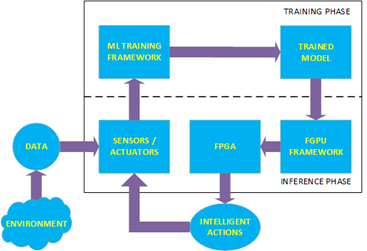Objective
To develop and demonstrate “best practices for embedded AI” by means of four industrial case studies:
- Embedded Security;
- Smart Sensors;
- Automotive;
- Industry 4.0.

Methods
Use of FPGAs as accelerators for embedded AI techniques:
Adaptability and scalability - the goal is to come up with a concept which would be easily suitable for variety FPGAs manufactured by different vendors. Furthermore, adaptation to the application requirements is also envisioned.
Low cost – the industry companies could benefit from the proposed approach only by purchasing affordable FPGA boards that cost only few thousand dollars or less.
- Dynamic and partial reconfiguration to execute different AI algorithms;
- End-to-end solution that will provide a complete tool-flow to map from application model to efficient FPGA execution.
Role of BTU Cottbus-Senftenberg (Chair of Computer Engineering)
- Use of ML as a driver to extend the functionality of NextGen sensors and actuators for Industry 4.0.
Build a new class of intelligent devices able to react to the surrounding environment in order to perform self-calibration, predictive maintenance, self-organization and autonomous control.

Contact
- Prof. Dr.-Ing. habil. Michael Hübner
- Dr. Marcelo Brandalero
- M.Sc. Mitko Veleski
